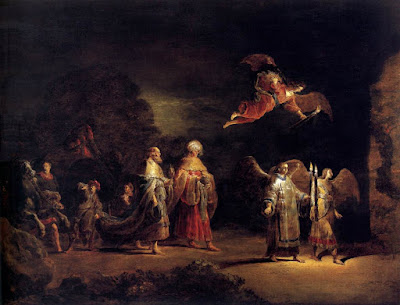This past Sunday was the celebration of Epiphany. While I’m a supporter of Epiphany being an immovable feast on Jan. 6, the priest’s homily for Epiphany was very good, so I’m glad I got to reflect on it again.
The priest himself is a missionary from Poland. He has traveled
all over the world to serve Christ in different cultures. And travel is a
pretty prominent theme in the Epiphany story. He made me reflect on the
importance of movement.
The magi were from a culture separate from Judaism. We don’t
know if they were Zoroastrian priests or Persian kings or Babylonian scholars
or a troupe of various backgrounds. But they were foreign. And they were on a
journey in search of something. They had seen a sign that an important child
had been born—so important that they traveled a long way just to see the child
and pay him homage.
Their particular beliefs or what they were expecting to see
isn’t as relevant as their action. They were faithful and sincere, willing to journey
a long way and suffer hardship for just one moment with something divine. They
were willing to leave their homelands and cultural comforts and offer up
expensive items. They were willing to ask questions and keep seeking until they
found him.
It's five and a half miles from Jerusalem to Bethlehem.
Jerusalem, the heart of Judaism, was only a couple hours’ walk away from the
Infant Jesus. But the people who were supposedly eagerly awaiting the Messiah didn’t
go (a few shepherds excluded, of course). The people of the culture Jesus was
born into didn’t see him as anything special. But the magi did. And they travelled
possibly over a thousand miles to be there.
Now, for most of us, the physical distance isn’t that
difficult. Christ is no longer a baby in Judea; he is present in the Church all
over the world. But still, we must seek him out and travel to him. For some, he
is closer to find. They live in a Christian community, with a church right down
the road. Christianity is the only culture they’ve ever known. Others face
harsh challenges: remote areas with no churches, a culture that doesn’t recognize
Christ, family or friends who oppose conversion. Frankly, it’s not fair. Yet
some squander their proximity, taking it for granted, while others demonstrate
such courage and persistence for just a taste.
The priest on Sunday mentioned how when he came here, it was
the first time he had been in a culture that was Christian but not predominately
Catholic (Catholics make up about 3% of the population). It was his first time meeting
people joining the Church coming from other denominations, and they asked
questions that he, who had grown up in a very Catholic environment and become a
priest, had never considered.
Outsiders see things differently. They ask new questions.
They don’t know all the ins and outs, but they want to join. They are seekers,
willing to leave what they know and journey a long way, willing to suffer
hardship and sacrifice, willing to ask questions and keep seeking until they
are satisfied.
But we should all be seekers. Whether we are coming from
Jerusalem or Baghdad, we should be journeying to Bethlehem. We should never
take for granted when we are blessed with ease of access to the Church or the
sacraments, and we should never get lazy with our faith. The journey does not
end in this life; we should always be seeking, drawing closer to Christ. We are
called be poor, wayfaring strangers, following the signs, seeking the divine,
and not resting until we rest in him.




No comments:
Post a Comment